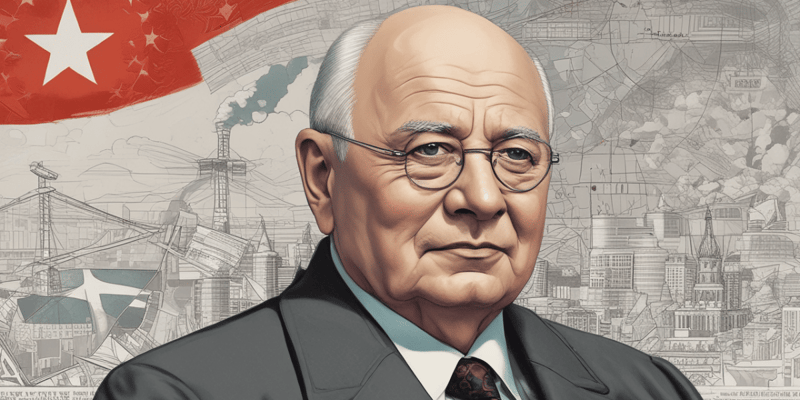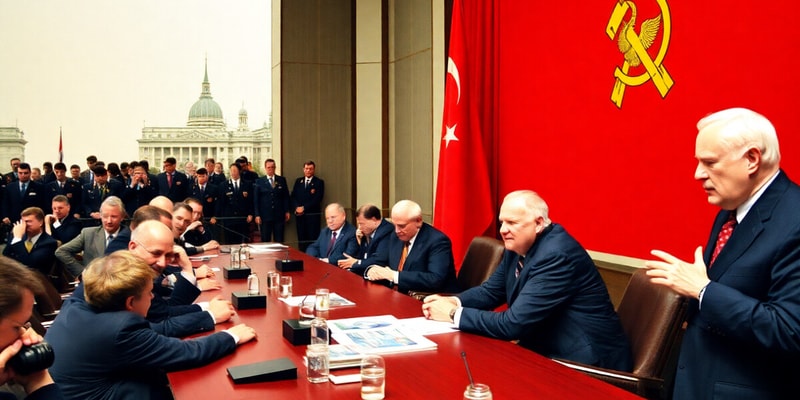Podcast
Questions and Answers
What was one of Gorbachev's main goals upon coming to power in the Soviet Union?
What was one of Gorbachev's main goals upon coming to power in the Soviet Union?
What was a significant outcome of Gorbachev's reforms in Eastern Europe?
What was a significant outcome of Gorbachev's reforms in Eastern Europe?
Which republics declared the disbandment of the Soviet Union in 1991?
Which republics declared the disbandment of the Soviet Union in 1991?
What approach did the post-Soviet republics adopt after the dissolution of the USSR?
What approach did the post-Soviet republics adopt after the dissolution of the USSR?
Signup and view all the answers
What was the relationship of the Central Asian republics with the idea of independence?
What was the relationship of the Central Asian republics with the idea of independence?
Signup and view all the answers
What was one major international role that Russia inherited after the Soviet Union's dissolution?
What was one major international role that Russia inherited after the Soviet Union's dissolution?
Signup and view all the answers
What economic burden contributed to the weakness of the Soviet system?
What economic burden contributed to the weakness of the Soviet system?
Signup and view all the answers
Which event highlighted the Soviet Union's military involvement during the Cold War?
Which event highlighted the Soviet Union's military involvement during the Cold War?
Signup and view all the answers
What change occurred in public perception within Soviet society during the decline of communism?
What change occurred in public perception within Soviet society during the decline of communism?
Signup and view all the answers
What was one suggested approach for the Soviet Union to coexist with the West?
What was one suggested approach for the Soviet Union to coexist with the West?
Signup and view all the answers
Study Notes
Gorbachev and Soviet Reforms
- Mikhail Gorbachev became General Secretary of the Communist Party of the Soviet Union in 1985, initiating reforms aimed at modernizing the USSR.
- Reforms included "perestroika" (restructuring) and "glasnost" (openness) to address stagnation and improve relations with the West.
- Gorbachev's aim was to maintain the Soviet Union's relevance amidst global technological advancements.
Consequences of Reforms
- Gorbachev's liberalization led to unexpected consequences, fueling desires for independence among Eastern European countries.
- Protests against Soviet control surged in the Eastern Bloc, culminating in the dissolution of the Soviet Union in December 1991.
- Key republics, particularly Russia, Ukraine, and Belarus, declared independence, effectively disbanding the Soviet Union.
Nationalism and Internal Struggles
- Nationalist sentiments were prevalent throughout the Soviet Union, particularly in its diverse republics.
- Gorbachev's reforms inadvertently intensified dissatisfaction, leading to calls for independence amidst economic challenges.
- The emergence of dissatisfactions within society stemmed from greater awareness of Western economic advances.
Economic Burdens and Decline
- The Soviet economy heavily invested in military and nuclear capabilities, stretching resources thin and contributing to economic decline.
- State priorities were skewed, focusing on maintaining a military presence rather than fostering economic prosperity.
Timeline of Soviet Disintegration
- 1985: Gorbachev elected; reforms initiated alongside appointment of Boris Yeltsin.
- 1988-1990: Independence movements sparked in Lithuania, Estonia, Latvia, and the Russian parliament declared independence.
- August 1991: Hardline elements attempted a coup against Gorbachev, which ultimately failed.
- December 1991: Official dissolution of the Soviet Union.
Impact on International Relations
- Following disintegration, Russia inherited the Soviet Union's UN Security Council seat and nuclear status.
- Russia engaged in arms control agreements with the US and disarmament measures, signaling a shift in international relations.
Russia and India Relations
- Russia benefits from arms sales to India, which is its second-largest arms market.
- Cooperative efforts include nuclear energy partnerships and assistance in India's space programs, emphasizing bilateral ties beyond military aspects.
Studying That Suits You
Use AI to generate personalized quizzes and flashcards to suit your learning preferences.
Description
Explore the transformative period of the Soviet Union under Mikhail Gorbachev’s leadership beginning in 1985. This quiz covers the shifts in power dynamics, the communist party reforms, and the historical context surrounding the Great Terror of the 1930s. Test your knowledge of this critical time in history.



